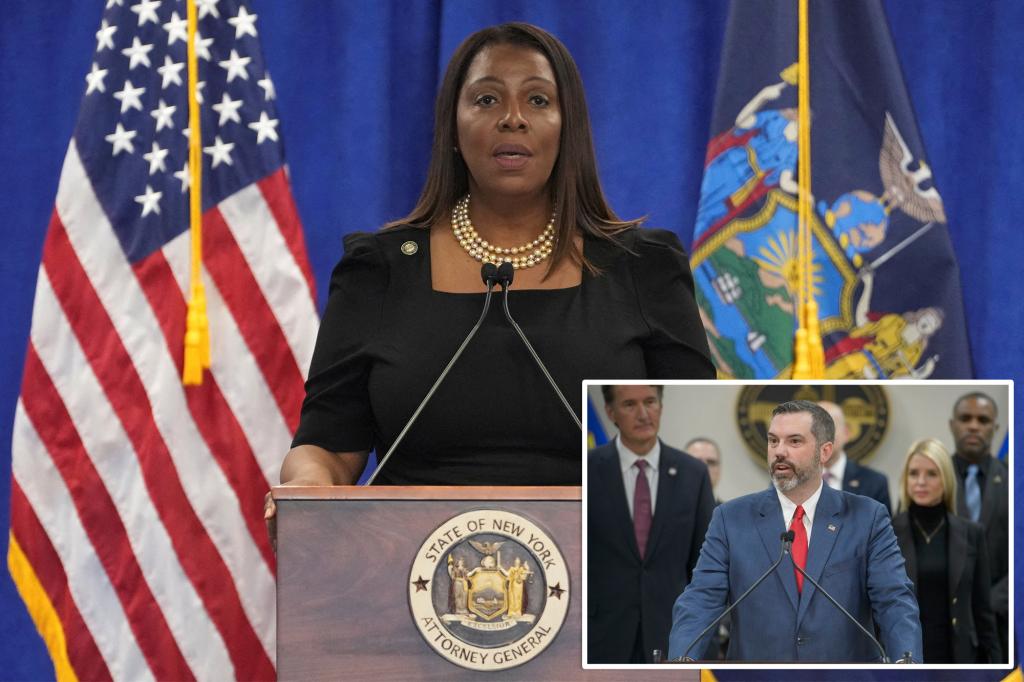Trump Calls for Dismissal of Prosecutor Weighing Fraud Claims Against NY Attorney General
In an unexpected turn of events from the Oval Office, President Trump has publicly called for the removal of U.S. Attorney Erik Siebert, the very prosecutor he nominated for the Eastern District of Virginia position back in May. During an impromptu exchange with reporters on Friday, Trump explicitly stated, “I want him out,” when questioned about Siebert, whose Senate confirmation remains pending. This sudden reversal appears to stem from Trump’s discovery that Democratic Virginia Senators Tim Kaine and Mark Warner had expressed support for the nominee, which apparently triggered the President’s change of heart. “When I saw that he got two senators, two gentlemen that are bad news, as far as I’m concerned, when I saw that he got approved by these two men, I said, ‘Pull him,’ because he can’t be any good,” Trump explained, offering a glimpse into his decision-making process that often seems to prioritize political loyalty over other qualifications.
The timing of this announcement has raised eyebrows across Washington, as it comes amid reports that Siebert is currently evaluating potential mortgage fraud allegations against New York State Attorney General Letitia James. According to sources who spoke with The Post, Justice Department pardon attorney Ed Martin was scheduled to meet with Siebert on Monday to discuss this very case, suggesting an active interest from Trump administration allies in pursuing charges against James. The confluence of these events—Trump’s sudden rejection of his own nominee just as that nominee is reportedly considering a case against a prominent Democratic state official who has been investigating Trump’s business practices—adds another layer of complexity to an already politically charged situation.
This development represents yet another example of the unusual relationship between the Trump administration and the Justice Department, where traditional boundaries between presidential authority and prosecutorial independence have frequently been tested. The public nature of Trump’s rebuke of Siebert, particularly before the prosecutor has even been confirmed, demonstrates the President’s willingness to openly intervene in matters that typically would be handled through more discreet channels. By publicly rejecting Siebert based on Democratic support rather than professional qualifications, Trump has once again blurred the line between political considerations and the administration of justice, raising questions about whether prosecutorial decisions are being influenced by partisan calculations.
The potential fraud case against Attorney General James adds another dimension to this story, as James has been a prominent legal adversary of Trump in New York, where her office has conducted multiple investigations into Trump Organization business practices. While the details of the alleged mortgage fraud involving properties in Virginia and New York remain unclear from the reporting, the fact that Trump administration allies are actively pursuing this case against one of Trump’s most visible legal opponents creates an appearance of potential retribution. This perception is only strengthened by the President’s sudden disavowal of the prosecutor who would make the charging decision, especially if that prosecutor was perceived as insufficiently aligned with the administration’s interests.
The reaction to Trump’s statement has been predictably divided along partisan lines, with supporters viewing it as the President’s prerogative to withdraw support for nominees who don’t align with his vision, while critics see it as another alarming instance of political interference in prosecutorial matters. This episode illustrates the ongoing tension in American governance between a president’s authority to direct the executive branch and the tradition of prosecutorial independence that has long been considered essential to maintaining public confidence in the justice system. As this situation continues to unfold, it will likely fuel further debate about the proper relationship between the White House and the Department of Justice.
In the broader context of Trump’s presidency, this incident fits a pattern of the administration’s approach to law enforcement appointments and prosecutorial decisions, where perceived loyalty often appears to take precedence over traditional qualifications or independence. As the Senate considers how to proceed with Siebert’s nomination in light of the President’s public rejection, and as the potential case against Attorney General James develops, observers across the political spectrum will be watching closely to see how these intertwined matters of law enforcement, political loyalty, and potential retaliation ultimately resolve. Whatever the outcome, this situation serves as yet another reminder of how conventional norms regarding the separation of politics from prosecution have been repeatedly challenged during this administration.










